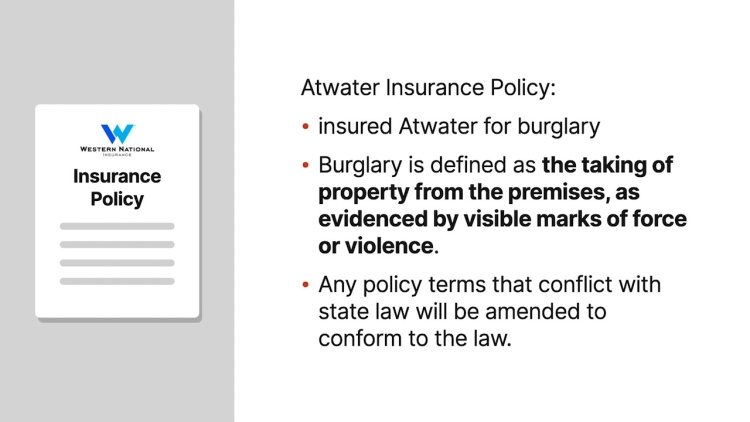Atwater Creamery Company v. Western National Mutual Insurance Company
Minnesota Supreme Court
366 N.W.2d 271 (1985)
- Written by Genan Zilkha, JD
Facts
Atwater Creamery Company (Atwater) (plaintiff) was a creamery and a supplier of farm chemicals in Minnesota. Atwater was insured against burglary for $20,000 by Western National Mutual Insurance Company (Western) (defendant) under a Merchantile Open Stock Burglary Policy (policy). The definition of burglary in the policy required that there be “evidence of forcible entry.” Between April 9 and April 11, 1977, chemicals worth $15,586.40 were stolen from an Atwater building during a burglary. Two of three storage-bin doors were open, and the doors’ padlocks were missing. The turnbuckles on one of the doors had been loosened. Following the burglary, Atwater filed a claim with Western under the policy. Western denied the claim because there was no evidence of forcible entry as required by the policy. Although Western’s insurance agent testified that he had told Atwater that the policy included a forcible-entry requirement, none of the members of the Atwater board of directors remembered being told about this requirement or reading the policy in full. Atwater filed suit against Western for the $15,586.40 loss and for $7,500 in business losses, costs, disbursements, and attorney’s fees. The trial court ordered judgment in favor of Western. Atwater appealed.
Rule of Law
Issue
Holding and Reasoning (Wahl, J.)
What to do next…
Here's why 907,000 law students have relied on our case briefs:
- Written by law professors and practitioners, not other law students. 47,100 briefs, keyed to 996 casebooks. Top-notch customer support.
- The right amount of information, includes the facts, issues, rule of law, holding and reasoning, and any concurrences and dissents.
- Access in your classes, works on your mobile and tablet. Massive library of related video lessons and high quality multiple-choice questions.
- Easy to use, uniform format for every case brief. Written in plain English, not in legalese. Our briefs summarize and simplify; they don’t just repeat the court’s language.





